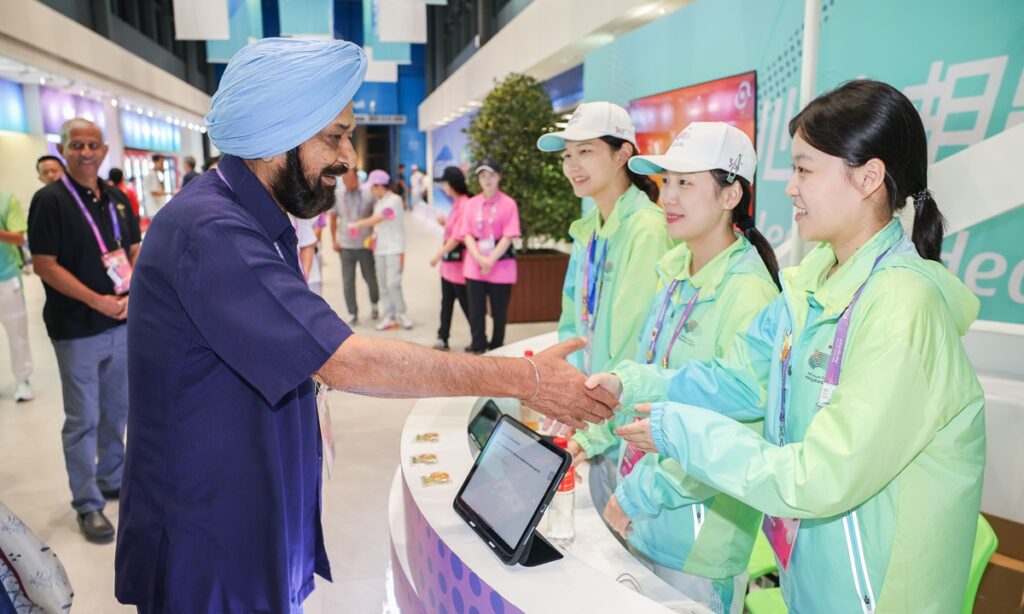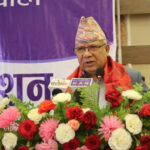Stories of dreams, hope and friendship
The 19th Asian Games held in Hangzhou (Hangzhou Asian Games), are nearing their end. However, stories of perseverance, dreams, encouragement, hope, blessings, and friendship continue to present and converge in Hangzhou, the modern technological city in East China’s Zhejiang Province.
Across the venues hosting the Hangzhou Asian Games, athletes of all delegations competed and performed together, writing a chapter of struggle and friendship; off the field, officials from the organizing committee and volunteers have wholeheartedly showcased the hospitality and friendliness of the host city, presenting a civilized and welcoming image to the world. All of these have left a deep impression on Raja Randhir Singh, the acting president of the Olympic Committee of Asia (OCA).
In an interview with the Global Times, Singh highlighted the close cooperation between the OCA and the Hangzhou Asian Games Organizing Committee (HAGOC) and recognized that the legacy left by the Hangzhou Asian Games has set a great example for all future major sporting events. The acting president also praised the strong performance of the Team China in the arena, while further emphasized the importance of keeping politics separate from sports during international sporting events.
A benchmark event
“When the Games is allotted to a country, you have the organizing committee and you have the OCA,” he said. “But the HAGOC and the OCA have worked so closely together [this time].”
Singh described their relations “like one family.”
“This is no OCA or the organizing committee. It is one Asian Games family,” he noted. “This is the most beautiful part of the Games.”
“The organizing committee has gone out on its way to help every national committees and all the technical people for whatever that helped it asked. You couldn’t have asked for more. At least the truth is that the guests were happy and satisfied too. It’s all to their credit,” the acting president said.
From bidding to hosting, Singh has visited Hangzhou on several occasions with the coordination committee. “We watched all the infrastructure coming up, the stadium and many of the indoor studios, and we visited the Asian Games Village, which is one of the most outstanding features of the schemes,” Singh said.
Singh noted he had stayed in a number of Asian Games Village setups. “But there is never a place like this one, with advanced facilities, good order and courteous volunteers,” he said.
There have always been different voices surrounding the hosting of major sporting events, such as environmental protection and sustainability. However, Singh pointed out that in Hangzhou, the “Green Games” are not just a future concept, but a reality in the present. “The Hangzhou Asian Games is an example, where digital fireworks were used instead of traditional fireworks during the opening ceremony, and all transportation was done using electric vehicles. In the past, all of this was unimaginable,” Singh said.
He also emphasized that sports can directly promote “green” development. “For example, during the preparation process for the Games, we also built many green sports parks, which can benefit many people, especially the youth.”
Speaking highly of Hangzhou as a modern city, Singh said that the beautiful infrastructure will become the biggest legacy for the city after the Asian Games.
“The venues are among the things you can be happy and proud to use in the future,” he told the Global Times. “Hangzhou now has a tremendous organizing capacity. Why can’t you hold more games?”
A stage to promote friendship and love
In Hangzhou, Singh, who competed in four Asian Games from 1978 to 1994 and five Olympics from 1972 to 1984 and was also India’s first Asian Games shooting champion, said that he was impressed by Team China’s performance in the Games so far.
As of Friday, the delegation has bagged a total of 183 gold medals.
Singh said he deeply felt the progress of Chinese athletes because he witnessed it personally. “It shows the phenomenal growth of sports in China,” he said. “The Chinese system for training athletes and the academies has good results. Maybe the rest of Asia should follow.”
At the same time, Singh also stressed that currently the Asian Games have already become a very prestigious event. “It’s no more that the second string of the athletes would come to this games, but with all the top champions attended. And that’s why the world’s records are being broke here many times.”
In all measurable sports standards, the Asian sport is coming up very fast. Initially Japan and South Korea were sports powerhouses, then China rose up, but now we find different countries are coming up with different sports, Singh said.
According to HAGOC, the Hangzhou Asian Games is the largest event in the history of the Asian Games, with the most number of sports and the widest coverage. Over 12,000 athletes from 45 countries and regions competing in 40 sports, 61 disciplines and 481 events. The Games will feature not only Olympic sports such as athletics and swimming, but also unique sports representing different regions of Asia, such as wushu, kabaddi, sepaktakraw and kurash. Additionally, there will be emerging sports popular among youth in recent years, including skateboarding, sport climbing, breakdancing, and esports. The Games have provided a platform for countries and regions in Asia to showcase their own sports and cultural characteristics, as well as the youthful spirit.
“Sports represent discipline, connection, and camaraderie. Those are the things young people need most.” Singh said he used to compete with his best friends on the field when he was young. It teaches you how to love: love yourself, love your family, love others, he said.
However, it was regrettable that currently, there are more people attempt to use the sports arena as a stage to express political views, and even deliberately create controversial issues, which undoubtedly creates a lot of trouble for the OCA and the organizers of the games.
“Politics is politics, and sports is sports. They should not be mixed,” said the Singh, answering questions from the Global Times reporters. “Politics should be kept separately…It is not a time for politics. This is 15 days or a month that one can keep the politics away and participate and enjoy the Games.”
“We are here to promote friendship and love between each other,” the OCA acting president said, noting that the Hangzhou Games is an event of peace and harmony, we have to continue to face the future with our hearts together, and this is a call to the world.
(Global Times)




